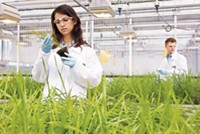Advertisement
Grab your lab coat. Let's get started
Welcome!
Welcome!
Create an account below to get 6 C&EN articles per month, receive newsletters and more - all free.
It seems this is your first time logging in online. Please enter the following information to continue.
As an ACS member you automatically get access to this site. All we need is few more details to create your reading experience.
Not you? Sign in with a different account.
Not you? Sign in with a different account.
ERROR 1
ERROR 1
ERROR 2
ERROR 2
ERROR 2
ERROR 2
ERROR 2
Password and Confirm password must match.
If you have an ACS member number, please enter it here so we can link this account to your membership. (optional)
ERROR 2
ACS values your privacy. By submitting your information, you are gaining access to C&EN and subscribing to our weekly newsletter. We use the information you provide to make your reading experience better, and we will never sell your data to third party members.
Business
BASF to buy slice of Bayer’s agrochemical business for $7 billion
Deal provides BASF entry into the seed market
by Alex Scott
October 18, 2017
| A version of this story appeared in
Volume 95, Issue 42

BASF has agreed to purchase a significant part of Bayer’s seed and herbicide business for $7 billion. The deal will mark BASF’s entry into the seed business, which has long been an area of investment by large agriculture firms thanks to innovations in biotechnology.
For Bayer, the sale is designed to quell regulators’ concerns that it would have unfair competitive advantage in agricultural markets after its planned $66 billion acquisition of Monsanto. In Europe, regulators are undertaking an in-depth probe of the Bayer-Monsanto combination. The companies have vowed to complete the deal in the first quarter of 2018.
While BASF has long supplied the agriculture industry, it focused mainly on seed coatings, herbicides, and fungicides. It has collaborated with Monsanto since 2007 to develop genetically modified plant traits but left seed production to Monsanto.
Now BASF will jump into the seed business with Bayer’s canola hybrids in North America, rapeseed in Europe, cotton in the Americas and Europe, and soybeans in the Americas. The canola seeds boast Bayer’s LibertyLink trait, which makes the crop tolerant to glufosinate herbicide.
All of Bayer’s research and breeding capabilities for the crops, including the LibertyLink trait, will also go to BASF. In addition, BASF will get Bayer’s line of glufosinate herbicides.
The businesses being acquired generated sales in 2016 of $1.5 billion and pretax profits of about $450 million. Bayer’s overall agriculture business generated sales of $11.7 billion and pretax profits of $2.1 billion. BASF’s agrochemicals business generated sales of $6.6 billion and pretax profits of $1.2 billion last year.
As part of the deal, BASF will acquire Bayer’s glufosinate production and formulation sites in Germany, the U.S., and Canada; seed breeding facilities in the Americas and Europe; and trait research facilities in the U.S. and Europe.
More than 1,800 commercial, R&D, breeding, and production personnel will transfer from Bayer to BASF, where they will be guaranteed employment for at least three years.



Join the conversation
Contact the reporter
Submit a Letter to the Editor for publication
Engage with us on Twitter